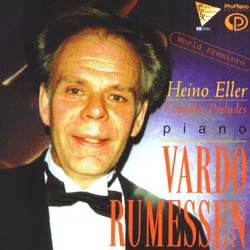Heino ELLER (1887-1970)
Complete Preludes for piano (1910-1937)
 Vardo Rumessen (piano)
Vardo Rumessen (piano)
rec 3-4 Nov 1997, Lefrak Concert Hall, New York
 PRO PIANO RECORDS
PPR224520
[71.29]
PRO PIANO RECORDS
PPR224520
[71.29]
ProPiano

Vardo Rumessen is something of a hero amongst those fascinated by Estonian
concert music. He gave the US premiere of Tubin's Piano Concertino in 1993
and has also performed, in concert, works by Tobias and Tubin. BIS have his
3CD set of the complete piano music of Eduard Tubin in their catalogue.
Rumessen knows the Eller Preludes from the inside. This is no exclusive recording
project for him. His belief in the music suffuses his playing and he draws
on deep wells of warmth as well as potency of technique. He performed the
Preludes in concert in 1987 and it is also worth noting that he has given
concert recitals of the complete Tubin piano music and piano pieces by Saar
(1982) and the complete fifteen Etudes-Tableaux of Rachmaninov (1980). Given
his approach to the Eller I suspect that his performance of the Rachmaninov
cycle would be a force to reckon with if only a recording existed.
The pianist is also active as a publisher having personally published Estonian
music by Saar, Tobias, Kapp, Oja and Eller. Rumessen it was who realised
Rudolf Tobias's oratorio Jonah's Mission. He has also written extensively
on the Estonian composers mentioned above. It is therefore no surprise to
find that the notes (English only) are by Rumessen and we are the beneficiaries
of his in-depth knowledge of his subject.
Eller's Preludes are presented in Five sets and an isolated single florid
Prelude in D flat major (dedicated by Rumessen to Scriabin's memory). Book
I comprises seven preludes dating from the early years of the twentieth century
(1914-17) and later much revised. However despite the revisions they seem
stylistically unified in an idiom of high and striving romance close to
Rachmaninov and Bortkiewicz but with impressionistic incursions. The Fifth
is a superb hyper-romantic little study - well worth sampling. When you think
of the world turned on its dark side at the times these were written it adds
to the tragic muse of the final D minor prelude. This starts out grotesque
and ends in flourishing majesty.
The Second Book (seven preludes) comes from 1920. While the remnants of
late-romanticism are present (try the D flat major prelude at track 13) the
music is seized by a more impressionistic hand. This adds hesitancy and wispy
fragmentation with a more recondite and (in the case of the G minor Prelude)
Stygian approach to harmony. Many of the pieces have a fragrantly orchidaceous
character without collapsing into the refulgent complexity of Sorabji. With
this book you are part way towards Bernard van Dieren's Six Sketches (1911)
and Sorabji's Jardin Parfumé. In the G flat major prelude (track
11) Chopin is heard through a Debussian filter. Sorabji, who was a ruthlessly
demanding epicure, rated York Bowen's Twenty-Four Preludes (recorded complete
in the 1990s by Marie-Catherine Girod on the Parisian Opes 3D label) extremely
highly. I wonder if he ever heard these Eller works?
There are Four preludes in Book III. The first two come from 1921 and all
four display that lunge toward discontinuity and an almost pointillistic
approach which is at its most extreme in the last two preludes (tracks 17
and 18, 1925 and 1932 respectively). The fourth set so grouped on this disc
spans 1929-1937 with the first three of five from 1929 when Eller seemed
close to the world of Miaskovsky in his Symphonies 10 and 13. This is the
music of which surrealism is made. Images melt and blend with the freedom
that only the dreamlike state allows. The music is glistening, retiary and,
in the 1937 Prelude, allows what seems to be a vision of a Macdowell sketch
viewed through the none too forbidding refraction of the Twentieth Century's
loss of innocence.
The fifth group are from 1934 and unlike the 1937 Prelude are in most cases
(the B major is the exception - oblique in expression though ending
conventionally) straightforward. In the case of the A major (track 25) this
might easily be from a enthralled pupil of Peter Warlock (try the Folk
Song Preludes) or E J Moeran (e.g. The White Mountain). The Fifth
(C sharp minor) glistens with the stellar radiance of Gerald Finzi's In
Terra Pax.
This is the world premiere recording of the Preludes.
Rob Barnett

NOTE
I am grateful to Vardo Rumessen for pointing out that:-
(1) the Prelude D Flat Major by Eller was dedicated to Scriabin by Heino
Eller himself (not by Rumessen).
(2) the Oratorio by Rudolf Tobias was restored and completed by Rumessen.
By the way, it will be performed in New York Carnegie Hall in December 2001
by the American Symphony Orchestra, conducted by Leon Botstein. The work
waspreviously performed to acclaim in April 2000 in Cologne!
If in difficulty obtaining then please contact Pro Piano direct at:-
www.propiano.com
Classicmus@aol.com

